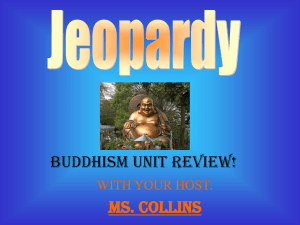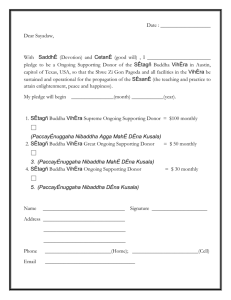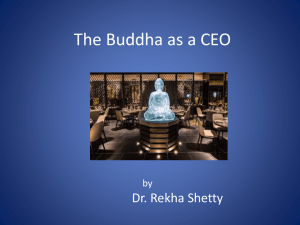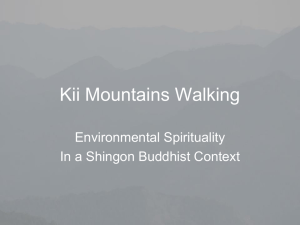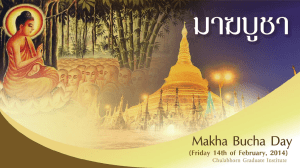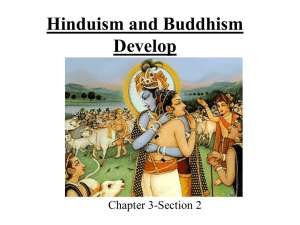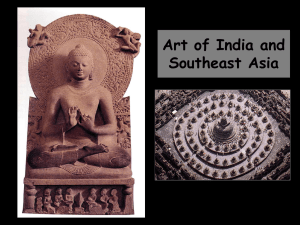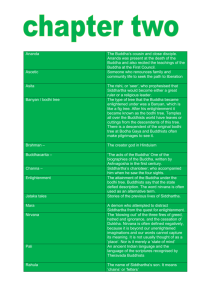Royal Patronage Of Buddhism During time of
advertisement
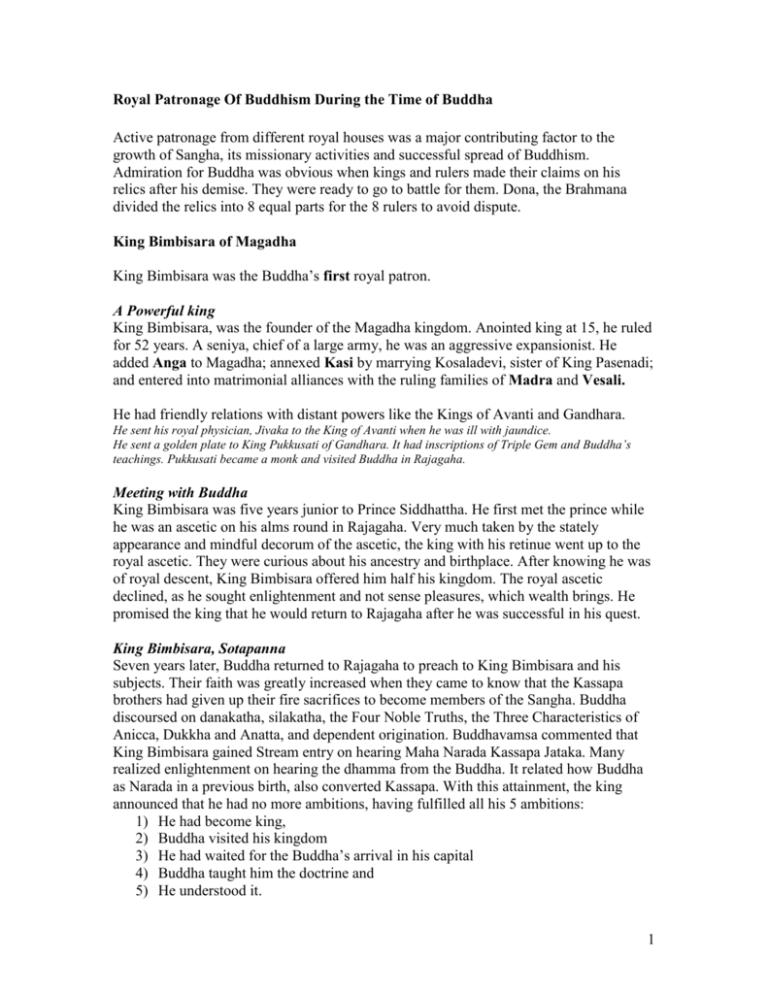
Royal Patronage Of Buddhism During the Time of Buddha Active patronage from different royal houses was a major contributing factor to the growth of Sangha, its missionary activities and successful spread of Buddhism. Admiration for Buddha was obvious when kings and rulers made their claims on his relics after his demise. They were ready to go to battle for them. Dona, the Brahmana divided the relics into 8 equal parts for the 8 rulers to avoid dispute. King Bimbisara of Magadha King Bimbisara was the Buddha’s first royal patron. A Powerful king King Bimbisara, was the founder of the Magadha kingdom. Anointed king at 15, he ruled for 52 years. A seniya, chief of a large army, he was an aggressive expansionist. He added Anga to Magadha; annexed Kasi by marrying Kosaladevi, sister of King Pasenadi; and entered into matrimonial alliances with the ruling families of Madra and Vesali. He had friendly relations with distant powers like the Kings of Avanti and Gandhara. He sent his royal physician, Jivaka to the King of Avanti when he was ill with jaundice. He sent a golden plate to King Pukkusati of Gandhara. It had inscriptions of Triple Gem and Buddha’s teachings. Pukkusati became a monk and visited Buddha in Rajagaha. Meeting with Buddha King Bimbisara was five years junior to Prince Siddhattha. He first met the prince while he was an ascetic on his alms round in Rajagaha. Very much taken by the stately appearance and mindful decorum of the ascetic, the king with his retinue went up to the royal ascetic. They were curious about his ancestry and birthplace. After knowing he was of royal descent, King Bimbisara offered him half his kingdom. The royal ascetic declined, as he sought enlightenment and not sense pleasures, which wealth brings. He promised the king that he would return to Rajagaha after he was successful in his quest. King Bimbisara, Sotapanna Seven years later, Buddha returned to Rajagaha to preach to King Bimbisara and his subjects. Their faith was greatly increased when they came to know that the Kassapa brothers had given up their fire sacrifices to become members of the Sangha. Buddha discoursed on danakatha, silakatha, the Four Noble Truths, the Three Characteristics of Anicca, Dukkha and Anatta, and dependent origination. Buddhavamsa commented that King Bimbisara gained Stream entry on hearing Maha Narada Kassapa Jataka. Many realized enlightenment on hearing the dhamma from the Buddha. It related how Buddha as Narada in a previous birth, also converted Kassapa. With this attainment, the king announced that he had no more ambitions, having fulfilled all his 5 ambitions: 1) He had become king, 2) Buddha visited his kingdom 3) He had waited for the Buddha’s arrival in his capital 4) Buddha taught him the doctrine and 5) He understood it. 1 Offering of Alms and Transference of Merits King Bimbisara invited Buddha and Sangha for alms on the following day. The king was so busy hat he forgot to transfer merits to his departed relatives. At night, he was disturbed by these pretas. The king reported to the Buddha who advised that he transferred merits to them. They were then freed from their preta existence. Offering of Bamboo Grove King Bimbisara decided that Veluvanarama, Bamboo Grove, also known as ‘The Sanctuary of the Squirrels’ was suitable accommodation and offered it to Buddha and the Sangha. He built a storeyed house and attendants helped in the maintenance of the residence. Buddha spent 6 rainy retreats at Veluvanarama. Offering of free Medical Service and transport He appointed his personal physician, Jivaka to take care of medical needs of Buddha and the Sangha. Transport was free for the sangha and all other recluses in his kingdom. Buddhist influence on family and subjects He requested his family, royal officers and subjects to listen to the teachings of the Buddha and practise them in their daily lives. They were not to do any bodily harm to Buddha and any member of the Sangha. King Bimbisara influenced Khema, his chief consort to see the Buddha and listened to his teachings. She joined the order after she saw the impermanence of beauty and vanity of lust. She was known for her great insight. Influence on Sangha order King Bimbisara also had a great influence on the Buddha with regards to administration: Buddha agreed with King Bimbisara that anyone in the royal service should not be allowed to join the Sangha and this was made into a rule. This was to avoid troubles with a king who does not understand Buddhism. Buddha also took up Bimbisara’s suggestion that Sangha hold uposatha days like the followers of other religious sects. Death King Bimbisara had several sons and was killed in his old age by Ajatasattu (unborn enemy). Devadatta, a cousin and brother-in-law of the Buddha instigated him to kill his father to take over the kingdom. He attempted to starve his father but was foiled by his mother who brought food in her waist pouch, hid it in her hair knot and later smeared honey over her body. He then forbad the mother to visit the king. Despite this, the king walked up and down in spiritual joy. Ajatasattu then ordered the barber to cut the soles of his feet, putting oil and salt on them, and forcing the old man to walk on burning coal. The king expired shortly after, at 67 years old. He was reborn in the realm of celestial kings, the lowest of the heavenly realms. This happened 8 years before Buddha’s Mahaparinibbana. 2

